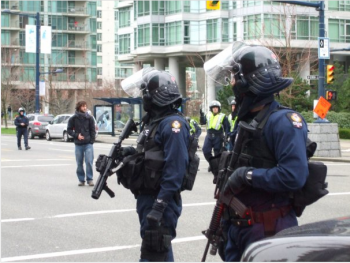Bill C-309 is the latest attempt by the Harper Government to strangle dissent.
Put forward by Alberta Wildrose backbencher MP Blake Richards, the Bill is an amendment to the Criminal Code. Specifically, it makes it illegal to wear a mask at an “unlawful” protest, a crime now punishable with a decade-long jail sentence.
Richards has gone on the record defending his Private Members Bill as a well-intentioned response to the Vancouver Riots, stating in the House of Commons that “this tool in no way restricts citizens’ rights to expression or assembly. In fact, it serves to strengthen them.”
This might seem counterintuitive as the Criminal Code already has a section against committing any crime in a disguise and Vancouver police actually had a lot of trouble from rioters who had their faces uncovered.
Yet this isn’t the first time masks have been used to stifle protest. In the early days of Occupy, New York Police dusted off a 150 year old law, banning masked at gatherings of two or more people justifying dozens of arrests. The city of Montreal also passed a similar bylaw with the hopes of combating the student protests. The problem with this Bill (and ones like it) lies in their ambiguity.
Canadians have the right to “peaceful assembly” under section 2(c) the Charter of Rights and Freedoms. But what separates a peaceful protest from a riot is often at the discretion of police.
According to Paul Champ of the BC Civil Liberties Association “it is often very unclear when a ‘lawful assembly’ becomes an unlawful one. And if it does become unlawful, did a person present at the assembly want it to become disorderly? And how do they remove themselves from the scene?”
For that matter, what constitutes a mask isn’t any clearer. As Interim Liberal Leader Bob Rae asked on Parliament Hill after the Bill passed third reading, “when does wearing a toque low on your face become a mask?”
With Bill C-309 now headed for the Senate, here are five ways activists can expect it will affect them.
1) Activists are more likely to be arrested.
Police arrest activists for a variety of reasons, including helping disperse a crowd. In larger demonstrations, like the G20, this can mean mass-detaining protesters. Protesters can only be held if they are charged with something, which is often ‘obstruction of justice.’ Bill C-309 creates a brand new charge police can add, giving them the chance to target protesters wearing masks.
2) Activists will have a harder time defending themselves.
Because an action can go from legal to not in a matter of seconds, there’s often confusion when police get involved. Conservatives have concluded that anyone not wanting to be arrested would leave a violent protest but the lines are so blurry it’s easy to get caught in the fray. Protesters in costumes who don’t even know things have gone south could be taken in and have almost no way to challenge the charges.
3) Fewer people will show up to protests.
For many folks, getting arrested isn’t an option. Criminal records make it harder to find employment and multiple charges can mean hefty fines. Even if someone is just detained and then let off, the process can still impact them later on.
Concealing one’s identity at a protest is also something that a lot of people just have to do. Much like Caitlin Curran, a journalist fired after being photographed participating in an Occupy Wall Street protest, there are countless activists who need to be anonymous to protect their jobs. Many people want to take action but when the stakes seem too high, they’re less likely to come out.
4) Mainstream media coverage of protests will suffer.
Artistic resistance isn’t just a form expression: it makes a scene. Towering puppets of CEOs, giant paper-mâché Harper masks and groups of activists dressed as endangered animals attract photographers and television crews. Take away the masks, the costumes, the art from protests and mainstream media will continue to cover the status quo.
5) Protests will become less safe.
Once a protest is deemed a riot, police will often shoot tear gas to dissolve the crowd. But with Bill C-309, using a bandana or gas mask as protection from the onslaught is now grounds for arrest. This could make it more difficult for street medics to get to people who need help, risking arrest themselves just for protecting their faces from toxic gas.
Though Bill C-309 risks challenging more than just whether or not that guy in the Guy Fawkes mask will show up, the outcry so far has been muted. Activists need to come together to challenge this legislation for what it is: an unconstitutional affront to civil liberties.
Steffanie Pinch is the Activist Toolkit Coordinator for rabble.ca



